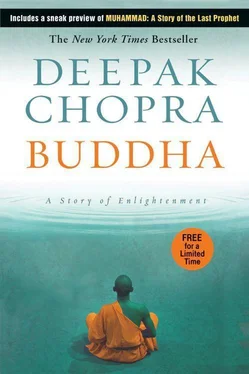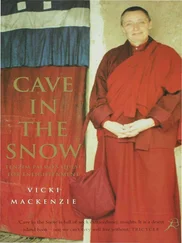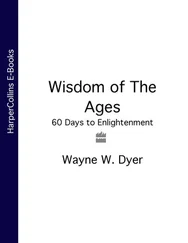Quickly, almost shaking, she quit her bed, throwing on her robe, and ran to her husband’s bedchamber. In the dim candlelight, Suddhodana lay twisted in the sheets. After their years of barren hopes for a son, he often slept alone now. Another king might have taken a lover who could provide him with a son. Another king might have simply had his wife murdered or locked away as a madwoman to dissolve the marriage contract. But Suddhodana hadn’t done those things. He had remained as fierce and loyal in love as in war.
Tonight will be different, Maya told herself. I have been blessed. Cautiously, not wanting to awake Suddhodana too suddenly, she lay beside him on the bed. Gently she stroked his face, drawing him up from sleep. His hands turned to fists at first, then his eyes opened and looked into hers. He started to speak, but she laid a finger over his lips.
She was not wild with desire, not its prisoner or slave. With her husband’s legs entwined with hers, she didn’t want pleasure as much as union. She encouraged him with words she never imagined saying. “Don’t make love to me like a king. Make love like a god.”
The effect was dramatic. Urgently, he reached for her, and she saw the wonder in his eyes. For so long their coupling had been perfunctory, neither of them believing that anything would come of it. But tonight he felt some of the strong belief that had awakened within her.
When she was ready, she rolled her hips and took him inside her. Her breath caught in her throat. The strange need within her reached a crescendo. For a few moments she entered that darkness of bliss that imitates immortality. Gradually she returned from it with a sigh, to find that the king was holding her in a tight embrace. He pulled her to him as if trying to meld his flesh completely with hers. They kissed and caressed; only her exhaustion in delight kept Maya from speaking what she knew with certainty: they had created a child.
The dream had sustained her in the terrifying trip through the forest and the pain of her labor. Now it was returning in more ghostly form every day. Her head sank into the pillow. It was still a lovely dream, she thought, and an escape from her great weariness. She even thought it would be better to live in her dream forever, if only she could.
IN THE ROYAL NURSERY Suddhodana gazed down at his son with awe and love. The baby had been presented to him in crimson silk swaddling clothes. He was certain the infant recognized him; it even grew in his mind that Siddhartha had kept his eyes shut until that moment, a fantasy no one dared to correct.
“Should he be sleeping this much? Why is his nose running? If he’s left alone for a moment, I will have someone whipped.” Suddhodana’s demands were incessant and maddening. As was the custom, Maya would be quarantined for a month after the delivery, subject to cleansing and religious rituals. Suddhodana chafed at this, but he could do nothing about it except sneak in by candlelight after the queen was asleep to gaze at her for a few moments. He wondered if new mothers always looked so wan and weak. Suddhodana pushed his troubling thoughts aside.
“Let him always be clothed in silk, and when they get soiled, throw them away. If you run out of silk, tear apart the court ladies’ saris if you have to.” Suddhodana wanted nothing with a hint of uncleanliness to touch his son’s skin. But silk was also a symbol, since Suddhodana was on the Silk Road returning home when a messenger sent by Kumbira reached him with the news that he had a son and a wife who were both alive.
Every morning the king strode forward through the ring of women that stood fanning the young prince with their shawls. Reaching down into the cradle, he withdrew his son and held him aloft. He stripped off the diaper.
“Look at him.” Suddhodana displayed his son in all his naked glory. “Well made.” All of the ladies knew what he was referring to. Kakoli, the royal nurse, started to mumble something agreeable.
“Impressively made,” Suddhodana said. “Not that I have your experience, Kakoli.” Suddhodana laughed and thought again how easy it was with his son in his arms. “Don’t blush, you old hypocrite. If he was twenty years older and we could take forty years off you, you’d fall off your feet running after it.”
Kakoli shook her head and said nothing. The handmaidens tittered and blushed. Suddhodana was certain they were more entertained than scandalized by his bluntness.
ASITA AWOKE in the forest thinking about demons. He hadn’t for many years. He could remember glimpsing one or two in the past, on the fringes of a famine or a battle, wherever bodies were being harvested. He knew the misery they caused, but misery was no longer Asita’s concern. He had been a forest hermit for fifty years. The affairs of the world had been kept far away, and he passed whole days in a hidden cave when he retreated even from the affairs of animals, much less those of men.
Now Asita knelt by a stream and considered. He distinctly saw demons in his mind’s eye. They had first appeared in the dappled sunlight that fell on his eyelids at dawn. Asita slept on boughs strewn over the bare ground, and he liked the play of light and shadow across his eyes in the early morning. His imagination freely saw shapes that reminded him of the market village where he grew up. He could see hawking merchants, women balancing water jugs on their heads, camels and caravans-anything, really-on the screen of his closed eyes.
But never demons, not before this morning. Asita walked into the nearly freezing mountain stream, his body naked except for a loincloth. As an ascetic, he did not wear clothes, not even the robes of a monastic order. Lately he had felt an impulse to travel very high, nearly in sight of the snowcapped peaks on the northern border of the Sakya kingdom. Which put him close to other lokas, worlds apart from Earth. Every mortal is confined to the Earth plane, but like the dense air of the jungle tapering gradually into the thin atmosphere of the mountains, the material world tapered off into subtler and subtler worlds. Devas had their own lokas, as did the gods and demons. Ancestors dwelt in a loka set apart for spirits in transition from one lifetime to the next.
Asita had been raised on this knowledge. He knew also that all these planes merged into each other like wet dyed cloths hung too close on the line, the blue bleeding into the red, the red into the saffron yellow. Lokas were apart and together at the same time. Demons could move among humans, and often did. The reverse, a mortal visiting the demon loka, was much rarer.
He plunged his head under the water, then flung it back, sending long streams dripping from his uncut beard and hair. On days when he needed food, Asita carried his begging bowl down into one of the villages. Not even the youngest child was frightened to see a naked old man on the street with hair and beard down to his waist. Ascetics were a normal sight, and it was a sacred duty, if a wandering hermit showed up at one’s door near sunset, to offer food and hospitality.
Asita wasn’t hungry this day, however. There were other ways to keep the prana, or life current, going. If he did visit the demon loka, it would take enormous prana to sustain his body. There would be no air for his lungs to breathe among the demons.
He allowed the brilliant Himalayan sun to dry his body as he walked above the tree line. Demons do not literally live on mountaintops, but Asita had learned special powers that allowed him to penetrate the subtle world. He had to get as far away as possible from human beings to exercise these abilities. The atmosphere was dense around population. In Asita’s eyes a quiet village was a seething cauldron of emotions; every person-except only small infants-was immersed in a fog of confusion, a dense blanket of fears, wishes, memories, fantasy, and longing. This fog was so thick that the mind could barely pierce it.
Читать дальше












